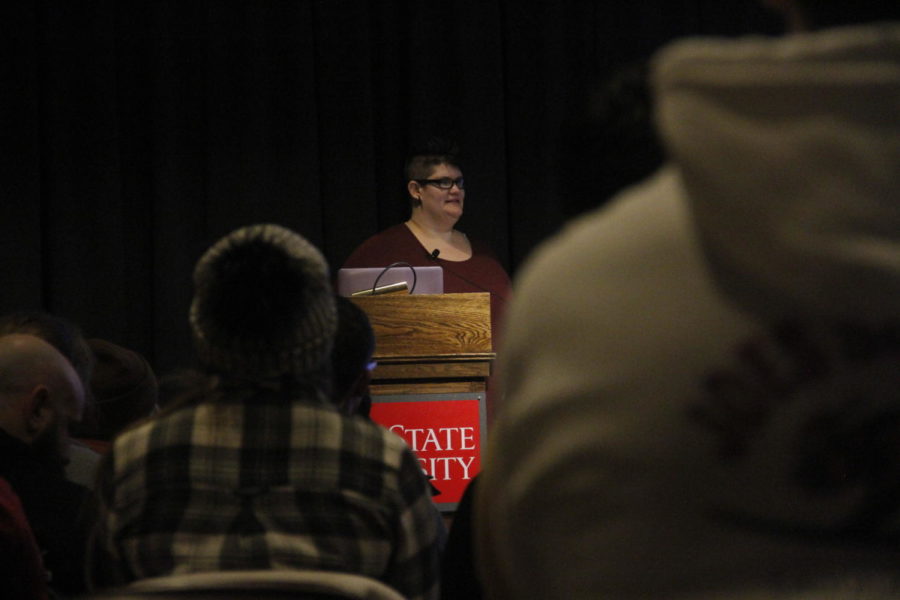Eating disorder recovery coach speaks about barriers, issues for treatment and recovery
SJ Thompson, a writer and eating disorder specialist, shares stories from their own recovery own recovery process during their presentation on barriers and access to eating disorder treatment at the MU on Feb. 27 as a part of Body Image and Eating Disorder Awareness Week.
February 27, 2019
Eating disorder recovery coach and consultant Sarah Thompson (S.J.) gave a lecture “But You Don’t Look Like You Have an Eating Disorder…” on Wednesday as the third event of Iowa State’s Body Image and Eating Disorder Awareness Week.
S.J. works to educate people on aspects of eating disorders, such as barriers to diagnosis, weight stigma and body trust.
During their lecture, S.J. said the first diet book was published in 1918, the first bathroom scale was introduced in 1919 and women received the ability to vote in 1920.
“I do not think that it was a coincidence that dieting started to be reported and a concern when women were starting to take their rights back,” S.J. said. “People that are obsessed with their bodies and obsessed with food and counting calories do not have time to be protesting.”
One part of eating disorders S.J. spoke about was body trust. According to the Be Nourished website, the definition of body trust “is a radical revisioning of what it means to occupy and care for your body.”
“Most of us lose that ability to trust our bodies,” S.J said. “The work that I do with people is to help them to learn trust their bodies again and to keep doing the things so eventually their bodies learn to trust them again.”
S.J. also listed some statistics surrounding eating disorders.
Sixty-nine percent of people said doctors were the second most common way they experienced weight stigma, with the first being from family members. Sixty percent said that bullying contributes to eating disorders, and 60 percent of “occasional dieters” developed disordered eating or an eating disorder and 91 percent of college women have dieted.
S.J. said there are a variety of barriers to diagnosis and treatment. There barriers include cost, as Medicare doesn’t cover it. Many have to take off work and there is no residential treatment in Iowa so patients have to travel for treatment.
“In addition to it being expensive, people can’t take time off work to go to treatment because how are they going to pay their bills if they are not working,” S.J said. “There’s the added cost of how to get to treatment.”
In addition to the barriers, S.J said there are many people who are overlooked when it comes to eating disorders. S.J said that women who are experiencing menopause, puberty, people of color or indigenous people, athletes, people with disabilities, large-bodied people are some of these people often overlooked.
Money, food and food security are also issues facing those with eating disorders. The more food insecure someone was, the more eating disorder pathology behaviors they have, S.J. said.
“We all have an inherent right to trust our bodies and to heal from food shame,” S.J. said.
S.J. said they recommended healthy behaviors such as getting enough sleep, eating enough food, staying hydrated and managing stress.
“If you hate your body you’re going to be way less likely to do any of these health behaviors,” S.J said. “Heal your relationship with your body will result in more of a desire to do health behaviors.”
Iowa State students who are seeking to speak to someone about these issues can visit the counseling center, on third story of student counseling building. Walk-ins are from 8 a.m. to 2 p.m. Monday through Thursday.







